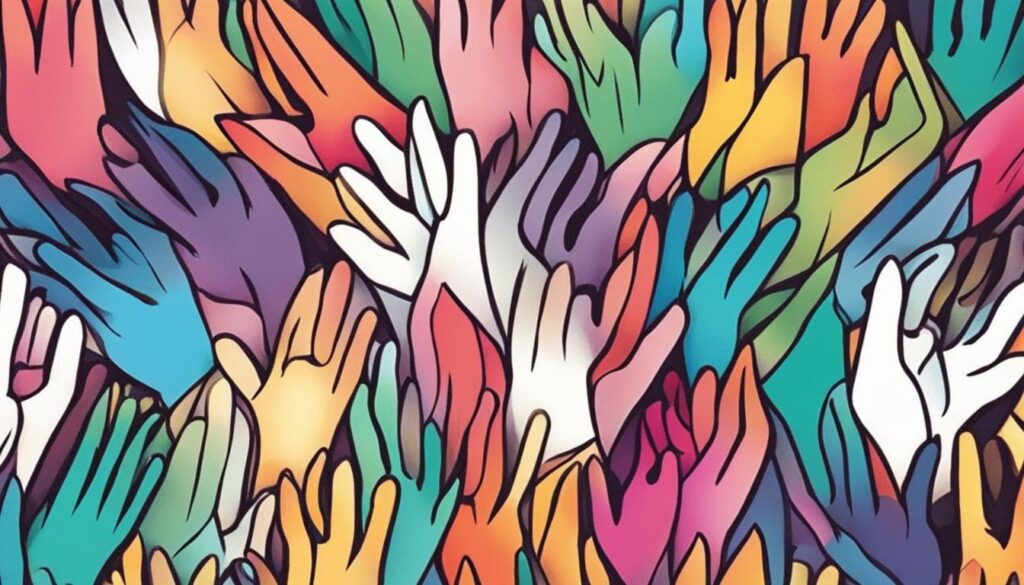Depression affects millions of people worldwide, but together, we can empower and inspire each other during our darkest moments. One way to offer solace and promote healing is through a movement that has captured hearts and minds across generations: writing letters against depression. With every thoughtful, heartfelt word, you can take part in creating a ripple effect of positivity that has the power to transform lives.
Find the comfort of knowing you are not alone in your struggle, and let the written word be a bridge to connect and uplift. By penning powerful letters and joining forces with this growing movement, you can help turn the tide against depression and brighten someone’s day – including your own.
Key Takeaways
- Create a positive impact through writing letters against depression.
- Empower and inspire individuals who may be struggling with mental health challenges.
- Provide solace to those in need by joining this meaningful movement.
- Experience personal growth and a sense of purpose through the process of penning powerful letters.
- Utilize your words to spread hope and awareness for better mental health.
The Power of Words: How Letter Writing Can Battle Depression
In today’s fast-paced digital world, the art of letter writing might seem like a lost practice. However, harnessing the power of words through writing letters can serve as a remarkable mental health support for both the writer and the recipient. Studies have shown that putting pen to paper provides numerous therapeutic benefits, offering valuable coping strategies for those battling depression.

Depression can manifest in countless ways, from feelings of hopelessness to a sense of isolation. Sharing these emotions through letter writing can lead to healing through writing. When individuals articulate their feelings in written form, they are more likely able to process their emotions and make sense of their experiences. Unlike fleeting conversations, letters provide a lasting tangible reminder that someone else understands and cares, fostering empathy and bridging the emotional gap.
Letter writing also offers a unique form of mental health support. As a low-pressure, introspective process, it empowers writers to explore both their emotions and thoughts with the freedom to revise and reshape them. This allows the writer to gain a better understanding of their own feelings and to face their struggles without fear of judgment or consequence.
“For many, writing is a safe way to cope with complex emotions, and it can even bring positive change to one’s life.” – Dr. James W. Pennebaker, Psychologist and Author
There is a wealth of evidence substantiating the numerous benefits of therapeutic writing. Dr. James W. Pennebaker, a renowned psychologist, and author, has conducted extensive research on how writing about traumatic events can improve physical and emotional health. Through his studies, he discovered that individuals who wrote about their deepest thoughts and emotions experienced a significant boost in mood and overall well-being.
So, how can you start your own healing journey through writing letters? It might be helpful to have a few guiding points in mind. Here are a few tips to help you get started:
- Emphasize validation of emotions and experiences shared in the letters.
- Offer genuine support and encouragement as coping strategies.
- Be honest and authentic in your writing, as this will establish trust and rapport between writer and recipient.
- Provide a platform for open and non-judgmental communication, fostering a sense of connection and understanding.
| Benefits of Writing Letters | Benefits of Receiving Letters |
|---|---|
| Processing emotions and thoughts | Feeling heard and validated |
| Increasing self-awareness | Receiving support and encouragement |
| Offering a way to vent and release tension | Establishing a sense of connection with others |
By engaging in the time-honored tradition of letter writing, individuals can access a potent form of mental health support while fostering connections with others. Battling depression is a collective effort, and every heartfelt message has the potential to uplift someone in need. After all, the power of words can be underestimated, but their impact remains immeasurable.
Penning Down Emotions: A Step Towards Mental Wellness
Writing holds an innate power to enhance self-awareness, emotional intelligence, and emotional well-being. Engaging in a process of self-exploration through the act of letter writing can significantly improve one’s understanding of their internal emotional landscape and contribute positively to mental wellness.

Understanding Emotional Well-being Through Writing
When individuals take the time to articulate their emotions and experiences in writing, they dive deeper into their thoughts, feelings, and motivations. This process of reflection and self-exploration stimulates personal growth by encouraging the development of emotional resilience. Crafting letters can be a beneficial exercise in nurturing our mental wellness and paving the way for self-discovery.
“There is something about the rhythm of writing and expressing that feels calming. This act of describing, exploring, and accepting my own feelings frequently brings a sense of clarity in my life.”
Letter Therapy: A Form of Self-Help
Letter therapy emerges as a valuable form of self-help that allows individuals to process and express emotions productively. With this approach, individuals can engage in self-guided, personalized healing that caters to their unique needs and experiences. Embarking on a journey with letter therapy can involve numerous prompts and topics that promote healing and self-discovery.
| Prompt | Objective |
|---|---|
| Write a letter to your past self | Reflect on personal growth and lessons learned |
| Compose a letter of gratitude | Express appreciation for someone who has positively influenced your life |
| Pen a letter of forgiveness | Seek closure by offering or accepting forgiveness |
| Create a letter of encouragement | Uplift yourself or others with words of support and motivation |
Writing self-help letters can be a cathartic experience for both the writer and the recipient. As individuals communicate their emotions and experiences, they foster connections that contribute to their personal growth. Furthermore, by sharing these letters, we can inspire mental wellness in others and collectively work towards a brighter emotional landscape.
Templates and Tips for Effective Letters Against Depression
Writing letters against depression can be a powerful way to help yourself or others on the journey to overcoming depression. Here, we provide practical advice and templates to get you started, along with specific tips on crafting effective letters that resonate with sincerity, empathy, and encouragement.

Essential Elements of Effective Letters
An effective letter is built on three key elements:
- Sincerity: Be genuine and heartfelt in your writing, as it will create an authentic connection with the recipient.
- Empathy: Put yourself in the shoes of the person struggling with depression, and express your understanding and compassion.
- Encouragement: Offer uplifting words and support, emphasizing the recipient’s strengths and sharing hope for the future.
Structure and Flow of Your Letter
A well-structured letter ensures that your message is effectively communicated to the reader. Consider the following guidelines on organization and flow:
- Begin with a warm introduction; address the recipient by name, expressing your care and concern for their well-being.
- Share a personal story or anecdote that relates to their struggle, demonstrating your empathy and the universality of such experiences.
- Provide specific encouragement, focusing on the recipient’s positive qualities and achievements.
- End the letter with a message of hope and support, ensuring that the recipient feels uplifted and motivated.
Template #1: Letter to a Friend Struggling with Depression
Dear [Recipient's Name],
I hope this letter finds you well. I wanted to reach out and let you know how much I care about you and your well-being. Recently, I've noticed that you've been facing some challenges, and I want you to know that I'm here for you.
When I went through a tough time, I found solace in [share a personal story or way of coping with challenges]. I believe that, like me, you will overcome your struggles and come out stronger than before.
You have always been [mention a positive quality], and I admire your [mention another positive attribute]. These qualities will undoubtedly help you on your journey to overcoming depression.
Know that I'm here to offer my support and a listening ear whenever you need it. Together, we will get through this and emerge triumphant.
Wishing you hope, healing, and brighter days ahead.
Sincerely,
[Your Name]
Template #2: Letter to Yourself During a Difficult Time
Dear [Your Name],
I want you to know that I understand the depth of your struggle and the feelings of pain and isolation that can come with depression. But I also want to remind you of the incredible strength and resilience you possess.
Think back to the time when [share a story of personal triumph or growth]. Moments like those are proof that you have the power to overcome any challenge that comes your way.
Remember, you are valued for your [mention a positive quality], and you bring so much joy to others thanks to your [mention another positive attribute]. These qualities underscore your ability to persevere and grow stronger each day.
Take solace in the fact that you are not alone in this battle, and brighter days lie ahead. Success and happiness are within reach, and I firmly believe that you can and will overcome depression.
With love and unfaltering support,
[Your Name]
As you create your own letters against depression, remember the power of your words in offering hope and healing to yourself or others. By focusing on sincerity, empathy, and encouragement, you’ll compose effective letters that contribute to overcoming depression.
Sharing Your Journey: Encouraging Mental Health Awareness
One of the most powerful ways to foster greater mental health awareness and understanding is by sharing your personal journey, experiences, and insights with others. By opening up and revealing your struggles and triumphs, you can provide a source of inspiration and connection, demonstrating to others that they are not alone in their battles. The act of sharing has the potential to break down the stigma surrounding depression and other mental health challenges, ultimately empowering both the writer and the recipient.
“Your story can be an incredible tool for change – by sharing it, you are encouraging understanding, empathy, and acceptance for others who are struggling with their mental health.”
When writing a letter against depression, don’t hesitate to share your story, whether it’s an account of your struggles or someone else’s journey that you have witnessed. Each letter is a unique opportunity to reach out to others and offer solace, empathy, and hope. Through this, you contribute to breaking down the barriers that often prevent those experiencing mental health challenges from seeking and receiving support.
Overcoming Stigma with Each Letter
In order to reduce stigma and raise mental health awareness, it is crucial that individuals feel comfortable sharing their experiences and reaching out for support. Writing letters against depression is one powerful way to achieve this. Each letter that is shared publicly or privately helps to create an environment where mental health challenges are recognized, acknowledged, and understood. The impact of this cannot be understated; every shared letter has the potential to save lives and create lasting change.
- Share your personal experiences with mental health challenges and how you overcame or continue to manage them.
- Express empathy and understanding for the recipient’s struggles, validating their feelings and offering reassurance.
- Offer encouragement and hope, reminding the recipient that they are not alone in their journey and that brighter days are possible.
- Include resources and support networks for the recipient to consider, such as therapy, support groups, or helpful books.

To amplify the impact of your letters against depression, consider sharing them on social media platforms, blogs, or forums. By doing so, you will reach a wider audience and contribute to the collective effort to increase mental health awareness, compassion, and understanding in our society. Remember, your story matters, and your words have the power to make a difference.
As you begin your journey of sharing your experience and writing letters against depression, know that you are bolstering mental health awareness and signaling to others that it is okay to seek help, share their stories, and embrace vulnerability. In doing so, you promote an environment where empathy and solidarity become the norm, and the stigma surrounding mental health gradually dissolves.
Fostering Positive Change Through Letter Writing
In summary, letters against depression provide a significant source of support and connection for those struggling with mental health challenges. By crafting heartfelt and empowering messages, individuals can make a substantial difference in the lives of others, helping to alleviate feelings of isolation and hopelessness.
Embracing the power of writing does more than offering solace to those in need. It can enhance self-awareness, emotional well-being, and promote personal growth. Letter therapy serves as a unique self-help approach for both the writer and the recipient, fostering mental wellness and paving the path for healing.
By sharing personal stories and experiences through letters, every writer contributes to breaking down the stigma surrounding mental health. This collaborative effort is vital to inspiring change and raising mental health awareness in society. As you embark on your journey of crafting letters against depression, remember the inherent power of words to uplift, encourage, and empower lives – one letter at a time.
FAQ
How can writing letters help combat depression?
Writing letters allows individuals to express their emotions and experiences, providing both the writer and recipient an opportunity for connection and understanding. This process can be therapeutic, improving emotional well-being and mental wellness, and can empower people in their journey to overcome depression.
What are the key components of an effective letter against depression?
An effective letter should convey sincerity, empathy, and encouragement. It should be supportive, uplifting, and foster a sense of connection between the writer and recipient. Using a structured format, including an introduction, body, and conclusion, can also help to ensure that the letter is impactful and easy to read.
How does sharing personal stories help raise mental health awareness?
Sharing personal accounts of struggles with depression and mental health challenges helps to break down the stigma surrounding these issues. It encourages others to be open about their experiences, promoting a sense of solidarity and understanding, as well as fostering a more supportive and informed society.
What is letter therapy and how can it be used for self-help?
Letter therapy is the process of writing letters as a means for self-guided healing and self-discovery. It encourages reflection, self-exploration, and expression of emotions in order to better understand one’s internal emotional landscape and improve mental wellness. Letter therapy can be personalized to fit individual needs and experiences, with prompts or topics guiding the writing process.
How can I get started with writing letters against depression?
To begin writing letters against depression, first, reflect on your own experiences and emotions that you would like to express. Consider using prompts or topics that can guide your writing process. Consult available templates and writing tips to help ensure your letters are supportive, uplifting, and effective in conveying encouragement to those who may be struggling with depression.


